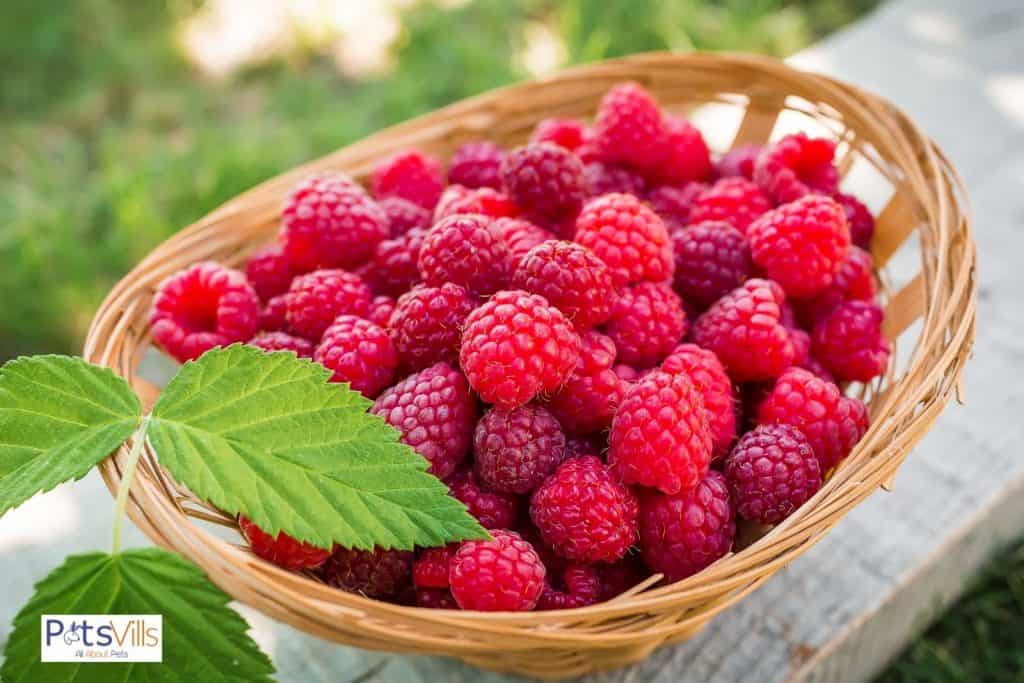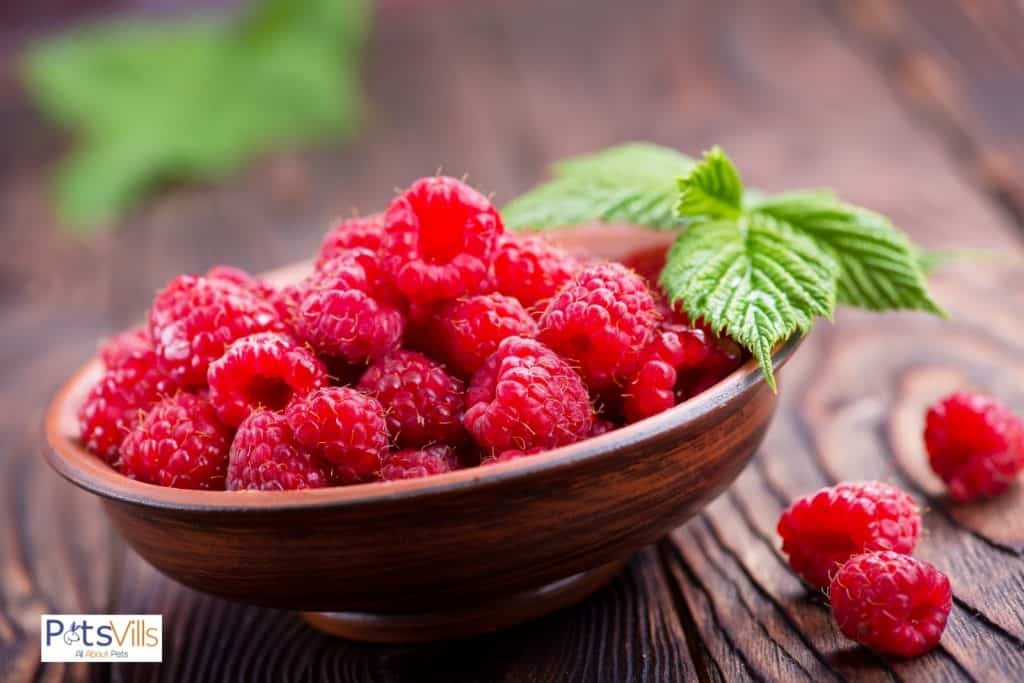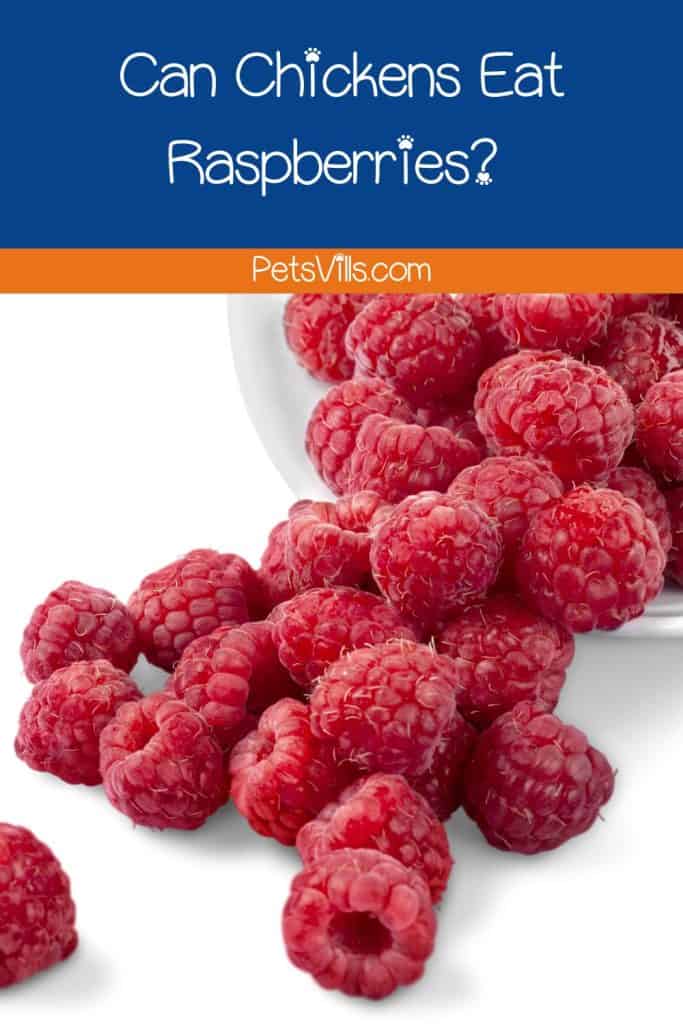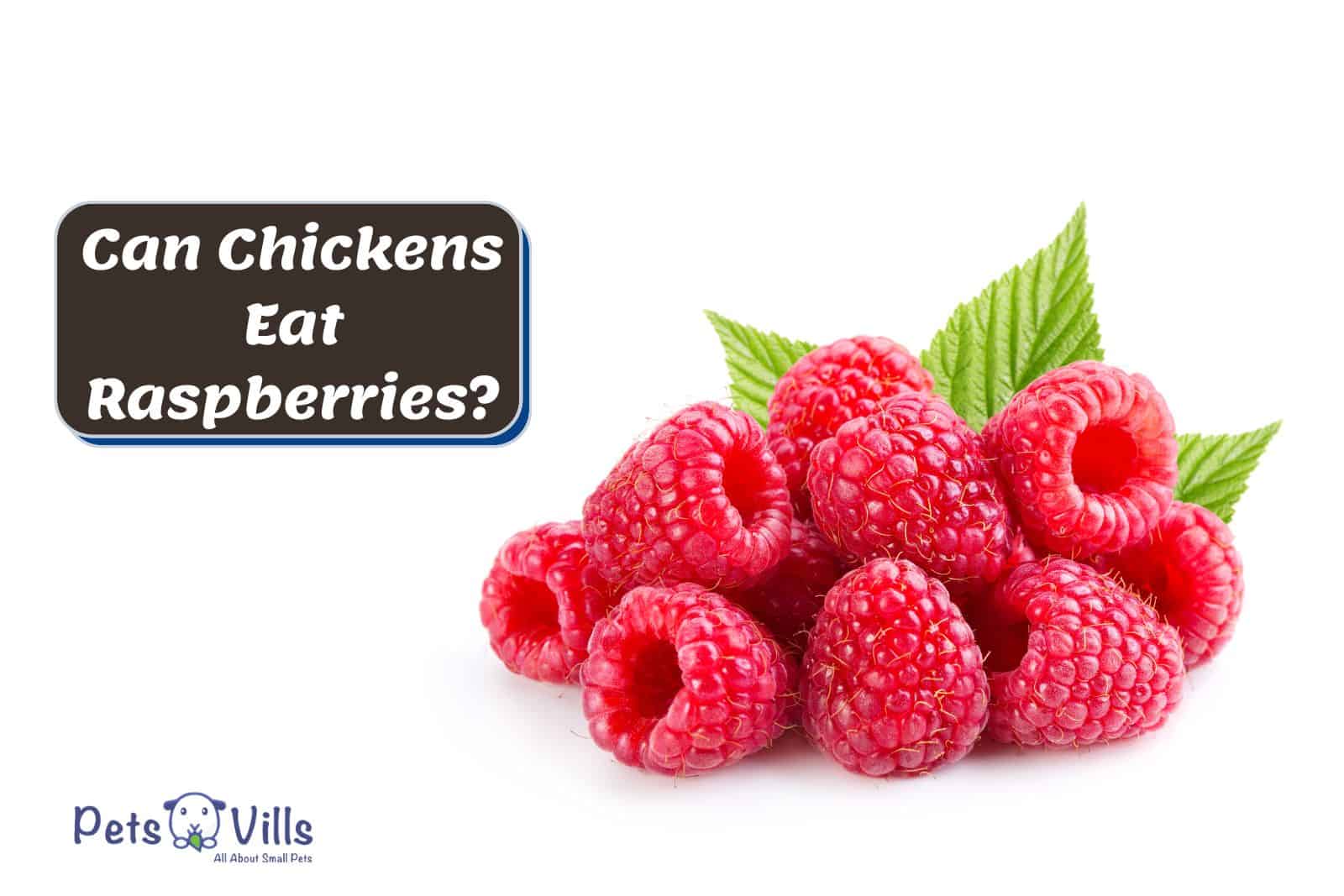Can chickens eat raspberries?
When my chickens sneaked a bite of my raspberry plants, I was relieved to learn that chickens can eat raspberries and that raspberries are a healthy snack for birds.
However, you’ve got a lot of things to keep in mind if you decide to include these juicy fruits in your feathered friends’ diets.
So, keep reading!
Table of Contents
Quick Summary
- Raspberries are safe fruits for chickens and can be a healthy alternative to table scraps.
- Feeding raspberries to chickens has many health benefits.
- Always opt for fresh or organic raspberries, and be careful if you treat your raspberry plants with pesticides.
Should You Feed Chickens Raspberries?
Before getting to the question, “Can chickens eat raspberries?” let’s talk about these red fruits and what makes them so popular.
What Are Raspberries?
Raspberries are one of the most popular berries thanks to their sweet, juicy taste and high nutrient content. They’re also a great source of antioxidants.

According to Healthline, one cup of red raspberries contains the following: (1)
- Calories: 64.
- Carbs: 14.7 grams.
- Fiber: 8 grams.
- Protein: 1.5 grams.
- Fat: 0.8 grams
So, raspberries are a great source of dietary fiber and are low in carbs and calories.
Raspberries also contain a wide variety of vitamins and minerals, beneficial for people and animals, such as vitamin C, vitamin K, vitamin E, and vitamin B.
But are raspberries good for your chicken’s health? Let’s find out!
Are Raspberries Safe for Chickens?
Yes, raspberries are among the safest fruits to include in your chicks’ diet. They don’t contain any dangerous substances, unlike avocadoes, apple seeds, or tomato plants.
Moreover, raspberries are rich in antioxidants, vitamins, and minerals. All these nutrients benefit the chicken’s health in many ways—more about that in a bit.
Chickens also love raspberries because of their soft texture and sweet flavor. And raspberries rarely pose a choking hazard for chicks.
However, raspberries should be an occasional treat for chickens. It’s not something you should feed at large or every day.
Chickens do best with a well-balanced diet of commercial feed supplemented with fresh vegetables, fruits, and table scraps.
But experts from RSPCA say, “Hens are just like us, they like a variety of food, so try not to feed them the same thing every day.” (2)
So, it’s best to give chickens raspberries as a special treat and in moderation. And are raspberries suitable food for baby chicks? You’d be surprised!
Can Baby Chicks Eat Raspberries?
Once chickens hatch, they need high-quality commercial chicken feed with about 20% protein to provide all the necessary nutrients. Otherwise, they won’t thrive.
Since the baby chickens’ digestive system is still developing, avoiding raspberries and other tasty treats is best until your chickens are a bit older.
In the first few weeks, hard-boiled eggs chopped into small pieces are the best treats for chickens because they’re an excellent source of protein. Some chicken owners also give sweetcorn.
But once your chickens are a few weeks old, you can transition to other juicy treats, such as raspberries. Introduce them slowly to avoid upsetting the chick’s tummy!
And now, let’s talk about all the health and nutritional benefits of feeding chickens raspberries.
Looking to add some variety to your chickens’ diet? Our articles “Can Chickens Eat Cucumber?” and “Can Chickens Eat Mango?” have got you covered with all the information you need to know.
Packed with valuable insights and advice, these articles will help you make informed decisions about feeding your feathered friends. Don’t miss out on these must-read resources for every chicken owner!
Health Benefits of Raspberries for Chickens
These sweet and juicy berries pack tons of health benefits into a tiny package. They’re a healthy treat and a great way to maintain a robust immune system, healthy bones, and shiny feathers!

1. Antioxidant Properties
Raspberries are bursting with antioxidants, such as vitamin E, vitamin C, and vitamin A. They help fight heart disease, keep the skin healthy, and promote proper growth.
Antioxidants also scavenge free radicals from the cells in the body and prevent or reduce the damage caused by oxidation.
Chickens fed raspberries, and other antioxidant-rich fruits will be healthier and happier.
2. Digestion
Raspberries have high fiber and water content. And that’s vital for chickens because it can prevent constipation and maintain a healthy digestive tract.
Chickens are prone to digestive problems, especially free-ranging chickens in the yards. Chicks have no taste buds, so they eat anything and everything that seems edible.
Feeding food high in fiber, like raspberries and cranberries, can prevent constipation and promote regular bowel movement.
3. Skin Health and Immune System
Raspberries are rich in vitamin C, a potent antioxidant. This vitamin is essential for keeping the skin healthy and promoting a healthy immune system.
Giving raspberries to chickens can strengthen their immune system and prevent them from getting sick. Also, their skin and feathers will be healthy and smooth.
4. Low-Fat Content
Raspberries are low in fat and sodium. And that makes them healthy food for chickens since too much fat can cause liver damage.
5. Protein and Calcium
Surprisingly, raspberries contain some protein and calcium. Both are vital for the proper bone development in chickens and assist in the normal production of eggs.
But feeding chickens raspberries has some drawbacks, which you should keep in mind.
What Are the Dangers of Feeding Raspberries To Chickens?
Raspberries contain a high level of natural xylitol. This is an all-natural sweetener in raspberries and a wide variety of fruits and vegetables.
Although xylitol is safe for humans, it can be toxic for animals. Xylitol is known to cause liver disease and hypoglycemia in dogs, but there are no data about its toxicity in birds.
Moreover, some studies show dietary xylitol can contribute to body growth and health in broiler chickens. (3)
Still, you should avoid feeding raspberries in larger amounts. While raspberries are full of healthy nutrients, they are rich in sugar.
Too much sugar and calories in your feathery friends’ diet can lead to a spike in blood sugar levels, weight gain, and other health issues.
Moreover, some concerns exist if you decide to feed your chicks raspberry leaves or frozen raspberries, as you’ll find out in a moment.
Can Chickens Eat Raspberry Leaves and Seeds?
The raspberry leaves do not contain toxins, so they’re safe for the chickens. And most chickens like nibbling on the leaves of raspberry plants. The danger lies elsewhere.
Raspberry producers often use fertilizers and pesticides to eliminate parasites and stimulate growth. And that means raspberry leaves are coated in these substances, which are dangerous for chickens.
So, unless the leaves come from an organic garden, you shouldn’t give them to your chickens.
And if your free-roaming chickens have access to your berry plants, you should only use products safe for animals.
As for raspberry seeds, they are also non-toxic to chickens. And that’s a good thing because it’ll be hard to separate the flesh from the seeds.
However, keep in mind that not all fruit seeds are safe for chickens. Apple seeds and avocado pits contain trace amounts of cyanide and are toxic to poultry birds.
Can Chickens Eat Frozen Raspberries?
You can feed frozen raspberries to chickens. However, frozen fruits don’t have the same amounts of nutritional value as fresh ones.
Still, frozen raspberries are great for keeping the chickens hydrated, especially during the summer when it’s hot. And frozen treats keep the chicks entertained and stimulated.
However, make sure that the frozen berries are unsweetened. Some frozen raspberries are dusted with sugar or packed with syrup to help preserve the flavors.
Sugar is terrible for chickens as it can lead to high blood sugar, weight gain, and other health issues. It can also interfere with egg production.
And how to feed raspberries to your feathery friends? Let’s find out!
How To Feed Raspberries To Chickens?
Raspberries are small in size and have a soft texture. Therefore, feeding raspberries to the chickens is pretty much straightforward. Just follow these tips:
- First, pick fresh raspberries and clean them to remove containment and pesticides. If possible, choose organic ones from the market.
- Introduce the raspberries slowly and observe your chicks for any adverse effects, such as an upset stomach.
- Raspberries have a soft texture, so you don’t need to worry about the raspberries being a choking hazard for the chickens. You can give them whole, as in this video:
- You can also slice them up for easier consumption.
- Don’t forget to provide plenty of water. And don’t overfeed your chickens on fruits.
But how many raspberries are too much for chickens?
How Much And How Often To Feed Raspberries To Chickens
Raspberries are a healthy food overall, but due to the high sugar content, you should feed them in moderation – a couple of times per week is enough to reap the nutritional benefits.
Also, berries and other fruits should only count for 10% of your chicks’ diet. The other 90% should be the nutrition from a high-quality feed.
When feeding raspberries to the chickens, you can give 1-3 raspberries to each chicken. Please don’t get your chicks too spoiled, or they can refuse to eat their feed.
FAQs
1. What Fruits Are Toxic to Chickens?
Avocadoes, apple seeds, and pits from cherries, peaches, apricots, etc., are toxic to chickens. You should also avoid nightshade plants, such as green tomatoes.
2. What Foods Are Poisonous to Chickens?
Chicken keepers should avoid giving chickens chocolate, onions, bean plants, pepper plants, or salty foods.
3. What Berries Can Chickens Eat?

Chickens can eat a wide variety of berries, such as raspberry, strawberries, blueberries, and cherries. But they shouldn’t eat elderberries, gooseberries, or blackcurrants.
4. Can You Feed Moldy Raspberries to Chickens?
Don’t feed your chickens moldy food. It can upset their stomachs and lead to other health complications. Fresh fruits are the best option for your birds.
Conclusion
Can chickens eat raspberries? Raspberries are a healthy treat for humans and chickens alike because these berries are full of antioxidants, vitamins, and minerals.
However, your chickens can enjoy raspberries in moderation, or the extra calories can lead to weight gain and problems with laying eggs.
Just don’t forget to clean the raspberries well if they’re treated with chemicals! And consult your vet if you notice any adverse effects.

What do you think about this topic? Can chickens eat raspberries? Tell us about your experience in the comment section.
Resources:
1. Groves M. Red Raspberries: Nutrition Facts, Benefits and More [Internet]. Healthline. 2018. Available from: https://www.healthline.com/nutrition/raspberry-nutrition
2. How to Care for Chickens | Blog [Internet]. RSPCA Queensland. Available from: https://www.rspcaqld.org.au/blog/pet-care/how-to-care-for-chickens
3. Takahashi K, Akiba Y. Single administration of xylitol to newly hatched chicks enhances growth, digestive enzyme activity and immune responses by 12 d of age. British Poultry Science. 2005;46:635–40.

My name is Ben Roberts, and I absolutely love animals. So, naturally, I love writing about them too! As far as my animals, I have a Pit-bull, a Beagle-lab mix, a Chihuahua, and one old cat. Each one of them provides me with a new adventure every day. And the best part is they’re all best friends. Well, except the cat when he gets a little annoyed.
FIND HIM ON: FACEBOOK and TWITTER.
Read his latest ARTICLES
Learn more about Benhere


